Obituary: Sir Christopher Lee
- Published
Nick Higham looks back at the life of Sir Christopher Lee, who has died at the age of 93
Despite playing an astonishing variety of roles, Sir Christopher Lee was never quite able to escape the legacy of Count Dracula.
His career spanned seven decades, and he was still appearing on screen well into his eighties, notably in Peter Jackson's blockbusting trilogy, The Lord of the Rings and Tim Burton's Dark Shadows in 2012.
His height - he was 6 ft 4 inches tall - and his deep and powerful voice meant he invariably dominated any scene in which he played. Yet it was a long hard slog through a host of bit parts before he achieved international recognition.
Christopher Frank Carandini Lee was born on 27 May 1922, in the upmarket Belgravia area of London.
Coincidentally, the year of his birth also saw the first screen appearance of the vampire in F W Murnau's silent classic, Nosferatu.
Lee's father was a Colonel in the Kings Royal Rifle Corps while his mother, Contessa Estelle Marie Carandini di Sarzano, was a noted Edwardian beauty whose image had been painted and sculpted by a number of artists.
His maternal ancestors had been given the right, by Emperor Frederick Barbarossa, to bear the arms of the Holy Roman Empire.
He spent part of his childhood in Switzerland, where his mother had taken him following the breakup of his parents' marriage, but later returned to England where he attended Wellington College in Berkshire.
Long road
In 1939, he volunteered to fight for Finland against the invading Soviet army but he saw no action and returned home to join the Royal Air Force.
Prevented from training as a pilot, due to poor eyesight, he became an intelligence officer, finishing the war as a Flight Lieutenant.
His parents believed he was too foreign looking to succeed as an actor but, thanks to some help from the then Italian Ambassador, his mother's second cousin, he signed a seven-year contract with the Rank Organisation.
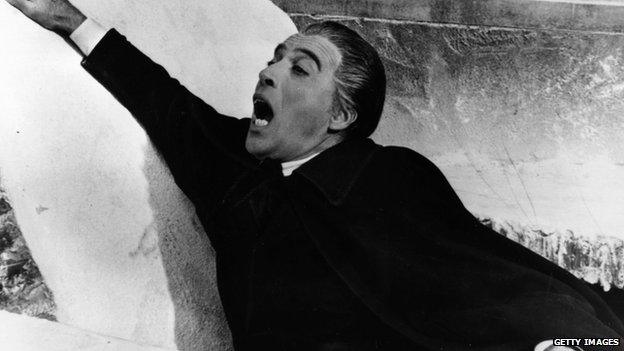
Dracula made him an international star
It was to be a long road to stardom; he set out to learn his craft in a string of minor theatre appearances, small film roles and even as a singer where he was able to demonstrate his fine baritone.
He already had 50 film appearances under his belt when, in 1957, he was signed by Hammer Films, which was embarking upon a series of re-makes of classic horror yarns.
His first appearance for Hammer was as the creature in The Curse of Frankenstein opposite Peter Cushing, who was to become a lifelong friend.
The Wicker Man
He followed it up a year later with Dracula, also with Cushing, who appeared as the vampire's arch foe Abraham van Helsing.
Although he only had 13 lines, Lee dominated the film, sweeping majestically down staircases and using his height and aquiline good looks to great effect.
He brought a new dimension to Bram Stoker's creation, playing the Count as a smouldering sexual predator, biting his way through a seemingly endless parade of Hammer's well-endowed starlets.
There followed a string of Hammer roles, including the title roles in Rasputin the Mad Monk, The Mummy and as Sir Henry in Conan Doyle's gothic mystery The Hound of the Baskervilles.
He also starred in The Devil Rides Out, based on Denis Wheatley's novel of black magic, which he persuaded Hammer to make and which many critics consider to be the studio's finest moment.
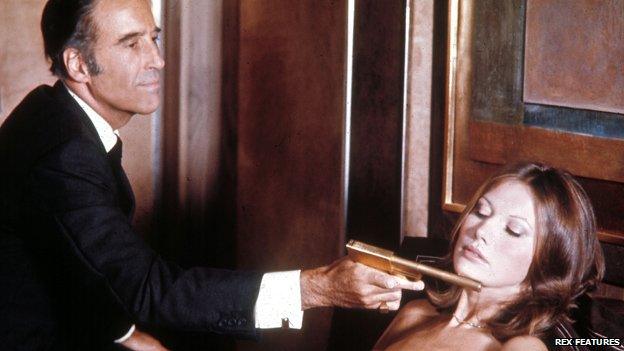
Sir Christopher tried to move away from Dracula with his role as Bond villain Scaramanga
Lee was to don Dracula's cloak and fangs in six more Hammer outings but, when the producers moved the fiendish Count into a modern setting in Dracula-AD 1972, and The Satanic Rites of Dracula, Lee decided it was time to call it a day.
In 1973, he appeared as the laird of a pagan Scottish community in The Wicker Man, a low budget film that has become a cult favourite.
"It's the best performance I believe I've ever given because the part was specifically written for me by the very distinguished Anthony Schaffer."
Gormenghast
Determined to move away from the horror genre, Lee took the role of Scaramanga in the 1974 James Bond film, The Man with the Golden Gun.
It was the second time he'd been considered to play a Bond villain. 007's creator, Ian Fleming, who was Lee's second cousin, put his name forward for the title role in the first Bond movie Dr No, but the producers had already selected Joseph Wiseman for the part.
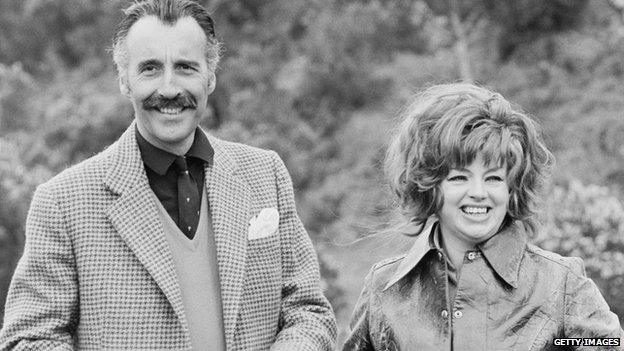
The actor starred with Diana Dors and Peter Cushing in Nothing But The Night
In the mid-70's, Lee's workload was so heavy that he had to turn down a number of lucrative roles including that of Dr Loomis in the Halloween series, something that he always regretted.
He also had to refuse the part of the specialist in Ken Russell's film, Tommy, a role that eventually went to Jack Nicholson.
A measure of his popularity across the Atlantic came when he hosted Saturday Night Live, watched by 35 million Americans.
And he proved he was no slouch when it came to comedy, notably in the improbable role of a gay Hell's Angel in the film Serial.
In 2000, he was seen as the loyal yet verbally challenged manservant, Flay, in BBC Television's lavish production of Mervyn Peake's Gormenghast.
He returned to the big screen with a vengeance the following year, portraying Saruman, the evil wizard, in the first of Peter Jackson's epic production of Lord of the Rings trilogy.
Bafta Fellowship
He had always been a great fan of JRR Tolkien's classic novel, which he claimed to have re-read every year, and he once admitted he had harboured a desire for decades to play the part of Gandalf.
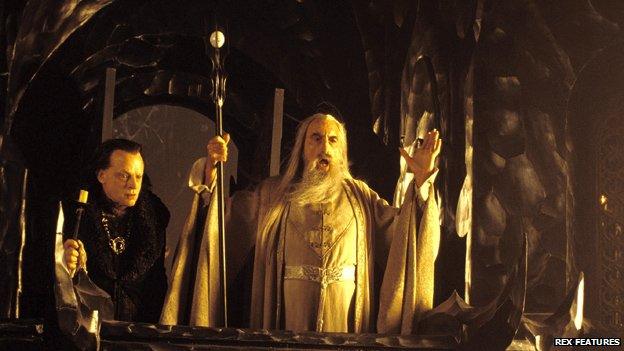
The role of Saruman brought him to the attention of a new generation
But he had to accept that, by the time the film was made, he was too old for the sword-fighting and riding which went with the part, which went to Sir Ian McKellen.
It emerged during filming that Lee was the only member of the cast who had actually met Tolkien, having bumped into him, years earlier, in an Oxford pub.
Things, however, did not go smoothly. Peter Jackson cut Saruman's scenes from the final version of the third film, The Return of the King, much to the annoyance of Lee and a large number of die-hard Tolkien fans.
"I really still don't know why," he once said. "I had a seven-minute sequence at the beginning of the third film, which was the final confrontation between Saruman and the members of the Fellowship. It's almost word-for-word Tolkien and the entire sequence was cut."
Nevertheless his performance brought him to a whole new audience whose parents had barely been born when Lee was finding fame with Hammer in the 1950s.
He further broadened his fan base with his appearance as Count Dooku in Star Wars II: Attack of the Clones and the follow-up Revenge of the Sith.
However, in an interview in 2004, he cited a little known art-house film, Jinnah, as his most important work.
"The most important film I made, in terms of its subject and the great responsibility I had as an actor, was a film I did about the founder of Pakistan, called Jinnah," said Sir Christopher.
"It had the best reviews I've ever had in my entire career - as a film and as a performance. But ultimately it was never shown at the cinemas," he said, claiming the subject matter made studios "a bit cautious".
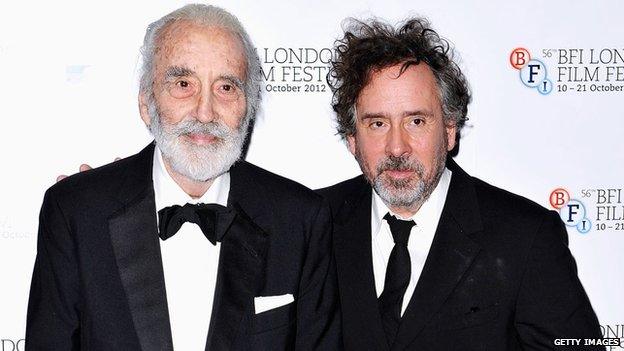
Sir Christopher's Bafta Fellowship was presented by Tim Burton
In 2009, much to the delight of his legion of fans, his career was rewarded with a knighthood in the Queen's birthday honours and, in 2011, he was awarded a Bafta Fellowship, presented by a great admirer, the director, Tim Burton.
His acceptance speech showed that, even at 88, he had not lost his touch. "I'm grateful," he told the audience at the Bafta awards, "that I am not following in the footsteps of the great Stanley Kubrick, whose award was posthumous."
Despite the wide variety of films he made Lee never really managed to shake off the shadow of Count Dracula and always expressed his irritation when interviewers or fans tried to define his career using that one role.
"People sometimes come up to me," he once said, "and they say, 'I've seen all your films, Mr Lee,' and I say, 'Oh no you haven't'."